Residents' suggestions and opinions heard at national level
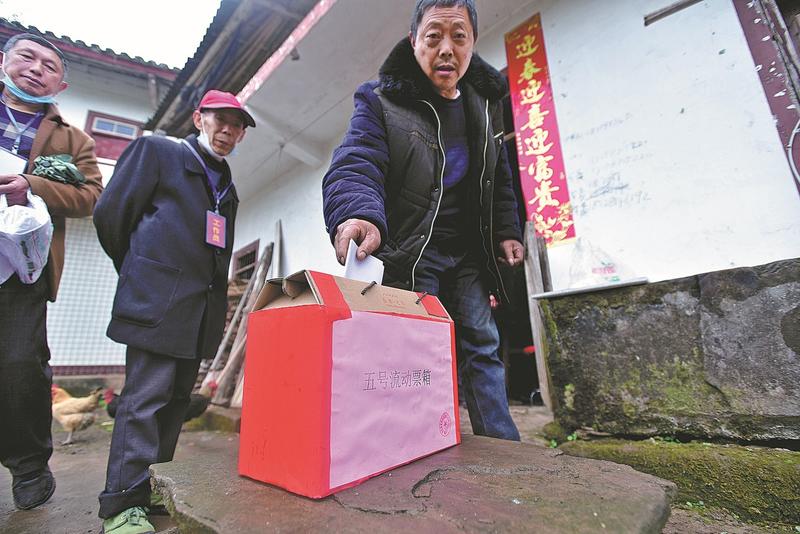 Villagers in Fengtian, Neijiang city, Sichuan province, vote for their leader on March 6. (HUANG ZHENGHUA / FOR CHINA DAILY)
Villagers in Fengtian, Neijiang city, Sichuan province, vote for their leader on March 6. (HUANG ZHENGHUA / FOR CHINA DAILY)
In the early 1940s, a popular saying vividly captured the enthusiasm among local voters when the Communist Party of China was based in Yan'an, Shaanxi province.
The saying proclaimed, "Beans roll, beans vote, beans go to the right bowls."
China is building a democracy with Chinese characteristics that involves more public participation and is more connected to the reality and interests of the people than many Western democracies
Evandro Carvalho, former visiting scholar in China and law professor at Brazil’s Getulio Vargas Foundation, an economic think tank
In those years, the CPC devised a simple method to ensure that illiterate farmers exercised their right to vote. Voters cast beans representing ballots into bowls placed on a table. There was one bowl for each candidate.
The CPC, from revolutionary times to ruling New China since 1949, has led the nation in exploring and developing a model of democracy that suits China's conditions, with the people as "masters of the country".
Delivering a speech at a grand gathering in Beijing on July 1 to mark the Party's centenary, Xi Jinping, general secretary of the CPC Central Committee, highlighted the development of "whole-process people's democracy".
The term whole-process democracy was first put forward by Xi, who is also China's president and chairman of the Central Military Commission, during an inspection tour of Shanghai's Hongqiao subdistrict in November 2019.
Exchanging ideas with community residents who took part in a survey on legislation, Xi said, "We are marching on a political development road of socialism with Chinese characteristics, and our people's democracy is a whole-process democracy."
In 2014, at a ceremony marking the 65th anniversary of the founding of the Chinese People's Political Consultative Conference, the national political advisory body, Xi said, "Democracy is defined not only by people's right to vote in an election but also by the right to participate in political affairs on a daily basis."
He said this depends on whether the people have the right to hold democratic elections, and also on whether they are entitled to make democratic decisions, conduct democratic management and exercise democratic supervision.
Experts said a series of institutional arrangements ensure the mode of democracy in China guarantees people's right to take part in democratic elections, consultations, decision-making, management and oversight, which constitute "whole-process democracy".
Different from Western-style democracy, which is often characterized by voting in elections every few years, Chinese democracy is a daily way of life for the people that leads to effective results, the experts added.
Wang Chen, vice-chairman of the National People's Congress Standing Committee, said during this year's NPC full session in March that whole-process democracy is "a hallmark of socialist democracy that distinguishes it from various capitalist democratic systems".
In March, the NPC adopted amendments to two laws concerning its organization and working procedures, with whole-process democracy being written into law for the first time in the country's legislative history.
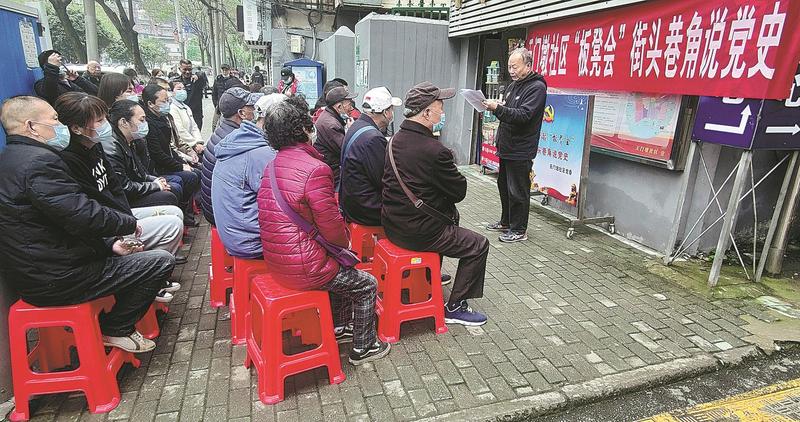 Residents in the Tianmendun neighborhood of Jianghan district, Wuhan, Hubei province, attend a briefing on April 8 on policies adopted by the Chinese Communist Party. (LI CHANGLIN / FOR CHINA DAILY)
Residents in the Tianmendun neighborhood of Jianghan district, Wuhan, Hubei province, attend a briefing on April 8 on policies adopted by the Chinese Communist Party. (LI CHANGLIN / FOR CHINA DAILY)
People's participation
Xia Yunlong, 81, a retired college teacher who has lived in Hongqiao, Shanghai, for 30 years, was given the title of information officer when a community-level contact station was set up by the NPC Standing Committee in 2015.
Draft laws are sent to such stations so that citizens can discuss them and voice their opinions to lawmakers. The station in Hongqiao was set up as part of the nation's efforts to diversify channels for people to provide their views.
An information officer gathers suggestions for draft laws, which are reviewed by the country's legislative bodies, making it easier for residents to make their voices heard at national level.
Xia said: "Being old is a disadvantage for doing many things, but it turned out to be advantageous for me in gathering opinions. Every time before we discuss a draft law, I ask many people-neighbors, relatives, former students and their parents-for their feedback."
He is extremely proud of a suggestion he made that citizens should be encouraged to sing the national anthem at "proper places and events" to express their love for the nation. The suggestion was written into the National Anthem Law of the People's Republic of China, which took effect in 2017.
You Yuanchao, a civil servant for Changning district people's congress, who works at the Hongqiao contact station, said opinions have been received from the public relating to 55 laws. More than 1,000 suggestions have been made, with 92 of them adopted.
"A complete working mechanism for the contact station was established from scratch, including eight steps from accepting a legislative inquiry to final suggestions being submitted," You said.
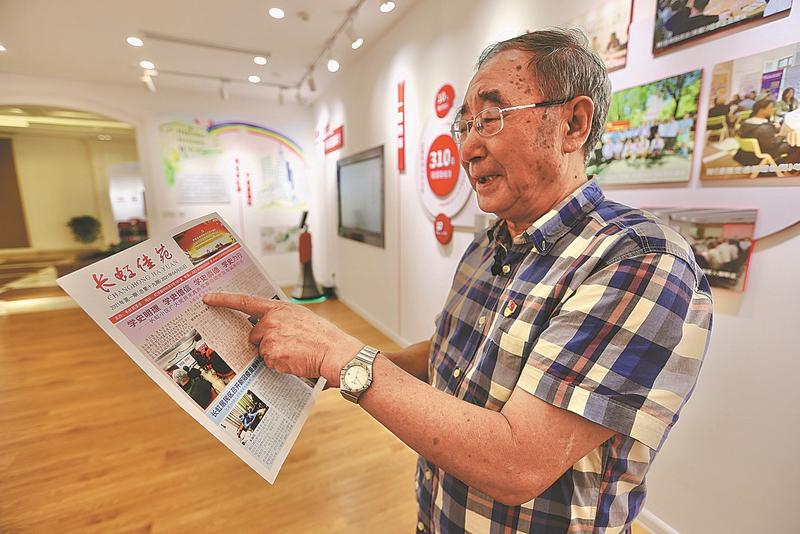 Xia Yunlong, 81, a retired college teacher who works as an information officer at a community-level contact station in Hongqiao, introduces a local journal to visitors. (GENG XINNING / XINHUA)
Xia Yunlong, 81, a retired college teacher who works as an information officer at a community-level contact station in Hongqiao, introduces a local journal to visitors. (GENG XINNING / XINHUA)
The suggestions come mainly from the information officers, whose numbers have risen over the years to 310, he said.
"We have professionals from local judicial bodies and also lawyers serving as our experts. They provide support for the information officers and help turn the colloquial language people use into the correct terminology for legislation," You added.
When the contact station receives a draft law for public opinion, You and his colleagues work out a plan to decide those whom the law would affect the most, the amount of inquiries to be handled and the number of seminars and discussions that are needed.
"We also organize study sessions on the drafts so that people learn related knowledge and can prepare better suggestions," You said.
Wu Xinhui, partner and attorney at the K&M Law Firm, who has provided legal aid and counseling for Hongqiao subdistrict since 2010, is also an information officer at the contact station.
As a lawyer focusing on civil and domestic affairs for 12 years, Wu said she can better discover loopholes that need to be addressed in current legislation. She also collates related cases to provide feedback to the national legislature.
Wu said her suggestion that seniors be included in the Anti-domestic Violence Law was adopted, adding that she raised it as she had handled a case in which the rights of an elderly person were infringed by that individual's children.
"This is a good way to send grassroots views to national legislators, and also reflects the democratic process as our country makes laws," she said.
Wu also submitted suggestions for the draft of the nation's first Civil Code and amendments to the Law on Protection of Minors and the Law on Prevention of Juvenile Delinquency.
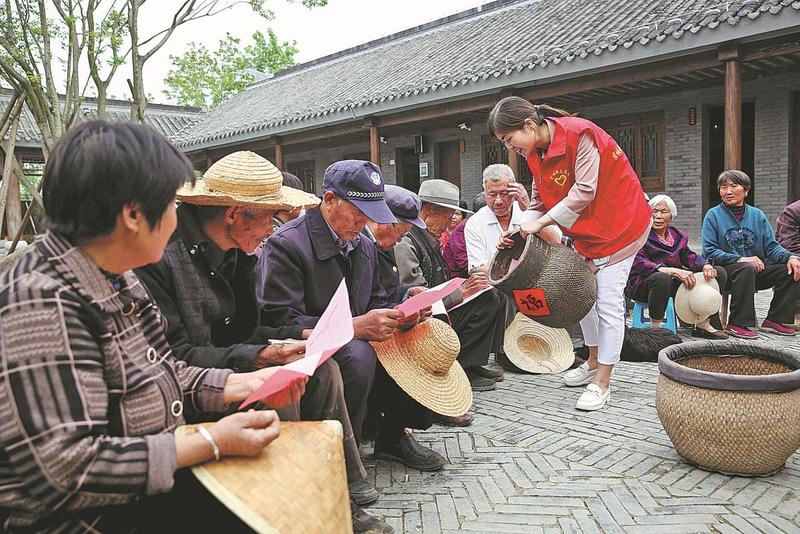 Villagers submit proposals to the Party committee in Bancheng town, Suqian city, Jiangsu province. (XU CHANGLIANG / FOR CHINA DAILY)
Villagers submit proposals to the Party committee in Bancheng town, Suqian city, Jiangsu province. (XU CHANGLIANG / FOR CHINA DAILY)
When President Xi visited the contact station's office at the Gubei Civic Center in Shanghai in 2019, Wu updated him on the work done for public legal aid and services.
A special zone has been set up at the civic center to display the contact station's work.
You said: "There has been a clear increase in awareness about and participation in our work, as many people come to see the display, learn about our working system and see the results. People care about whether their suggestions can really make a difference."
Zhu Lingjun, a professor at the Party School of the CPC Central Committee, said setting up such grassroots contact stations helps promote more-targeted legislation.
He said the Party has integrated the "mass line" into its governance activities, ensuring that it can hear the voice of the people on decision-making, implementation and oversight.
Zhu added that consultative democracy in China avoids the formalism of democracy in many countries, where people only have the right to vote but are not entitled to widespread participation.
"People in these countries only wake up to vote and then go back to sleep after they do so," Zhu said.
 A resident uses the library at the Gubei Civic Center in Shanghai. (GENG XINNING / XINHUA)
A resident uses the library at the Gubei Civic Center in Shanghai. (GENG XINNING / XINHUA)
Voices heard
Tang Yalin, a professor of public administration at Fudan University's School of International Relations and Public Affairs, said the purpose of democracy in China is to understand people's needs, and it is important to combine these with the nation's long-term development goals.
He said there are a number of channels for people to voice their opinions. These include public opinion hearings and expert symposiums convened before the publication of major laws, plans, policies and projects. Opinions can also be voiced through websites, Tang added.
"China has constantly explored and improved ways to involve the people in the whole process of democracy, in line with the development and changes in society," Tang said, adding that use of the internet is a relatively new trend.
Last year, while drafting proposals to draw up the nation's blueprint for the next five years and objectives through 2035, the central leadership called for efforts to reach out to the people and incorporate brilliant ideas in the plan.
Heading the drafting group, Xi stressed that top-level design should be combined with public opinion and encouraging people from all walks of life to put forward their suggestions.
In August last year, netizens' suggestions and advice for the draft 14th Five-Year Plan (2021-25) were sought online, the first time this practice had been adopted for the formulation of such an important document.
Last year, Xinhua News Agency released a video featuring a netizen whose opinions on the aging society were included in the document.
Li Dianbo, a village official in Dalad Banner, Inner Mongolia autonomous region, suggested online that a mutual assistance elderly care model be established in rural areas.
In Li's village, two-thirds of the 1,200 or so permanent residents are seniors whose children have left to find work in cities. He deals with the tough task of elderly care in rural areas every day.
Li suggested that in densely populated rural areas, the government build public canteens and dormitories for seniors willing to live together. Those who are relatively younger and more able could take care of seniors who are older and weaker, forming a mutual support and elderly care system.
His idea was later incorporated in the blueprint document by the central authorities. Li said, "I feel that the document was drafted by the central leadership in the interests of the people, and also with the participation of the people at grassroots level."
More than 1 million suggestions on the 14th Five-Year Plan were received online, according to official data. In addition, the Party leadership listened to opinions voiced at several symposiums by non-Party members, entrepreneurs and experts in various fields.
Han Wenxiu, deputy head of the Office of the Central Commission for Financial and Economic Affairs, who took part in drafting the document, said that the scope of opinion-seeking, the number of participants and the range of forums were unprecedented.
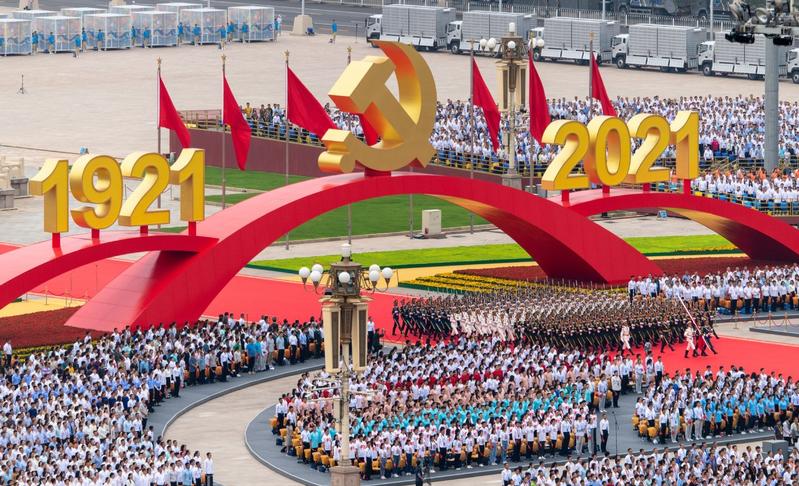 A grand gathering is held to honor the centenary of the CPC at Tian'anmen Square in Beijing, July 1, 2021. (PHOTO / XINHUA)
A grand gathering is held to honor the centenary of the CPC at Tian'anmen Square in Beijing, July 1, 2021. (PHOTO / XINHUA)
Effective democracy
Evandro Carvalho, a legal expert from Brazil, told Xinhua that China's socialist democracy is "not only a democracy in form, but in substance".
Such democracy is not limited to the democratic decision-making process, but also focuses on its outcome, said Carvalho, a former visiting scholar in China and law professor at Brazil's Getulio Vargas Foundation, an economic think tank.
Institutional arrangements for China's democracy involve the procedural aspects and public participation, with the aim of finding solutions to problems people face, Carvalho said.
"Unlike several Western democracies that are increasingly alienating the people from the political process and ignoring their needs, the Chinese government wants, with the use of technology, to listen more to the population and monitor the execution of measures to meet people's needs," he said.
"China is building a democracy with Chinese characteristics that involves more public participation and is more connected to the reality and interests of the people than many Western democracies."
Tang, from Fudan University, said electoral democracy in capitalist Western countries is a manifestation of the interests of political parties and capital, or a "populism ballot carnival" held by politicians to manipulate public opinion for their specific interests.
"As a result, it is a deviation from the public interest and has kidnapped public interest, which will cause potential risks to the prosperity and unity of the state," he said.
The operating mechanism for democracy in China does not rely on elections based on multiparty competition, in which people vote for leaders every few years but barely take part in national affairs in their daily lives afterward, he said.
Democracy in China is not a narrow voting process. Instead, it's a process in which people's opinions are heard and even absorbed into national policies, Tang said.
"The CPC doesn't pursue self-interest, and the supreme value of the Party resides in the Chinese people and Chinese national interests," he added.
Zhu, from the Party school, said that in Western democracy, a change in the ruling party results in change to policies.
He said that under China's system, on the premise that the CPC has the ruling role and decides the Party's basic line, outstanding cadres are selected and appointed to ensure this line is implemented.
"Politicians in China don't need to spend a lot of money and time on election campaigns. What they need to do is to serve the people with heart and soul, and they cannot shirk their responsibilities at any time," he added.
Contact the writers at zhangyi1@chinadaily.com.cn


